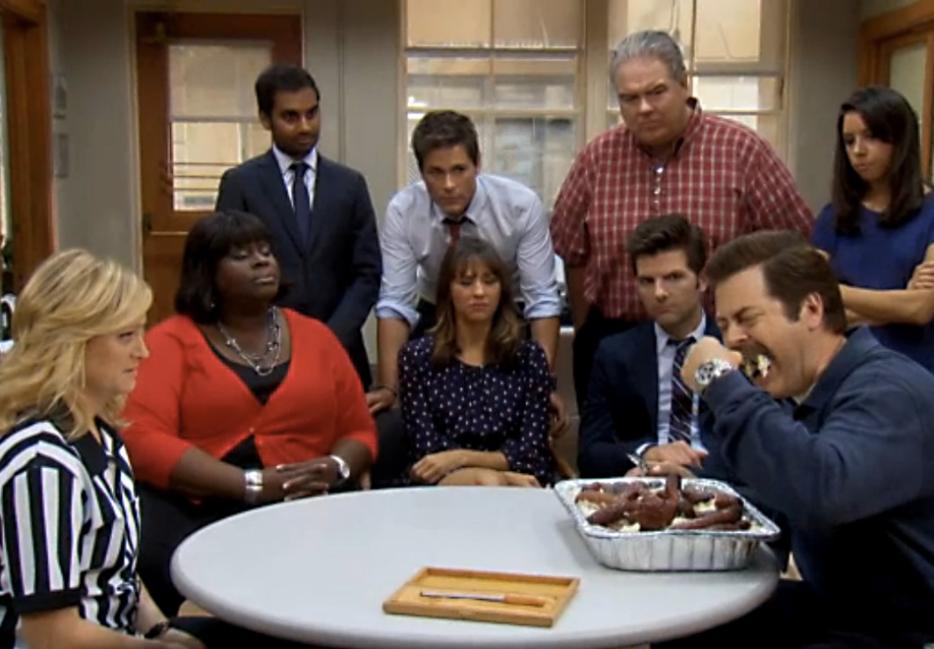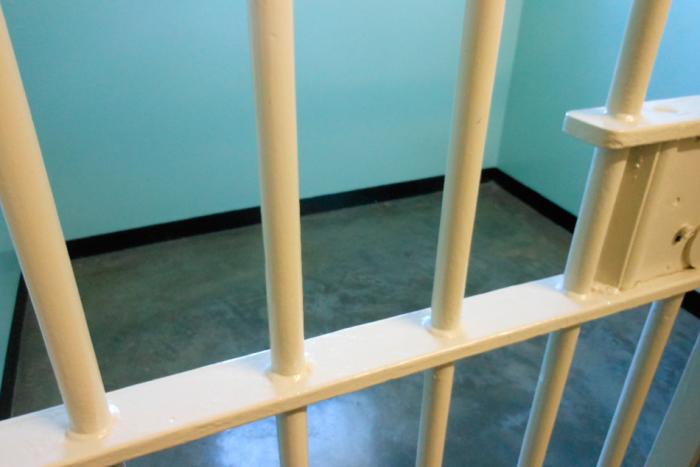At this point in Parks and Recreation’s run, speculation about its continued existence is almost as much a character of the show as Leslie Knope (Amy Poehler). When NBC announced early last week that it was going to be subjecting the sitcom to both a three-week hiccup and then a longer hiatus, some people suggested that this history of mistreatment actually made the decision easier: the show’s small group of fans is both so used to seeing it delayed and so willing to follow it that the network could basically air it over the course of a June weekend and the ratings wouldn’t see much change.
Worries about the show’s final doom aside, the annual Parks and Rec waiting game is at least a little easier this year thanks to one of the shows making up Fox’s increasingly strong comedy line-up: the Andy Samberg cop vehicle Brooklyn Nine-Nine. There are a lot of superficial similarities between the two—they’re both ensemble comedies about a group of civil servants featuring former SNL stars in yin-yang relationships with their stern bosses—but most importantly, both are under the care of Michael Schur, probably the best comedy show-runner working today.
Despite having worked on some of the most influential and/or beloved shows of the last decade—before he co-created and ran Parks, he was a key staff member (and occasional Amish cousin) on The Office, and a long-time writer at Saturday Night Live—Schur has remained relatively below the radar. In fact, it’s as likely as not that, if you do know Schur, you know him for his brilliant, acerbic work on Fire Joe Morgan, the sports blog where he punctured asinine commentary under the pseudonym Ken Tremendous. TV writers, of course, don’t tend to get a lot of attention among the public at large until they start winning Oscars or acting like assholes (or the Sorkin double), but even people who care tend to miss Schur for folks like Tina Fey or Mitch Hurwitz or Dan Harmon.
Excepting Fey’s cultural cache, the fact that this troika is more talked-about may have something to do with the fact that Schur’s voice, or in any case his biggest talent, isn’t quite as flashy. Neither a screwball wizard nor a Rubik’s Cube solver nor a cultural firehose, Schur works his best magic in the space between people, the ways that distinctive personalities try to actually get along. The distinctive feature of a Schur show—and, from most reports, a Schur writing room—is a dozen autonomous people playing off each other until something either thoroughly hilarious or achingly heartwarming happens. In an earlier era, he’d have been writing linked short story collections about life in rural towns.
Schur started working at SNL directly out of Harvard, where he wrote for the Lampoon. Good enough to last six seasons—including helping write “Weekend Update” during the Fey years—he joined The Office in its first season, and wrote some of the series’ signature episodes. “Christmas Party,” maybe the first really brilliant installment of the American version—it earned an Emmy nomination and started an annual series tradition—is a fine example of his style. Besides being abjectly hilarious—“Happy birthday, Jesus. Sorry your party’s so lame”—it features Michael Scott (Steve Carell) screwing everything up not out of malice, but out of the twin motives of jealousy and an honest desire for people to have fun (he forces everyone to do a Yankee Swap after he receives a lame Secret Santa gift); it ends with him feeling bad enough about that that he gets everyone hammered on vodka.
That sort of balanced ridiculousness is all over Parks and Recreation, though it tends to come out most perfectly whenever the beleaguered titular government employees have to deal with the public. “Time Capsule,” both written and directed by Schur, pulls this off in both micro and macro conditions: first, a divorced father chains himself to Leslie’s water heater and demands that she include the Twilight books in the town’s planned (wait for it) time capsule. This being Parks and Rec, he convinces most of the office to actually read the books, and when they sympathize with his attempts to bond with his daughter, they find a work-around by holding a town meeting to take suggestions—a meeting that features, among other things, an argument over whether the book series is too religious or not religious enough, as well as a chant about a dead cat. It ends with everyone gathered to watch the books’ film adaptations together in the park.
It’s telling that not only is there a distinctly sweet moment in both of those scripts, but that it’s a slightly ridiculous (and, in the former’s case, totally shitfaced) one; though Schur has a certain sentimental streak, it’s tempered with a dose of even-keeled reality—his shows are less likely to end in hugs than in knowing smiles from across the room. There was perhaps no greater showcase for his talent for restrained, honest emotion than during Parks and Recreation’s impromptu three-months-early city hall wedding between Adam Scott’s Ben Wyatt and a newspaper-dress-clad Leslie, probably one of the most romantic marriage ceremonies I’ve ever seen, including the ones between real people who I actually know.
Brooklyn Nine-Nine hasn’t been around long enough to earn the kind of honesty Schur is able to put into a script—although it has already established a nuanced undercurrent in the long-overlooked gay police captain played by Andre Braugher. But it’s just a matter of time; the show has already made apparent that each of the characters has a rich backstory waiting to be explored (Terry Crews’ physically imposing but psychologically fragile Sergeant, Melissa Fumero as Samberg’s over-eager, over-achieving partner). And there’s nobody in television better equipped to use a backstory in a more ridiculous or more surprisingly touching manner than Schur.





